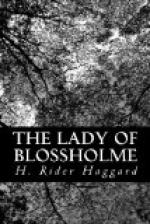“It seems that you priests are my heirs,” said Sir John in a new, quiet voice, “or so you say; and, if that is so, my life is likely to be short. I’ll not drink your wine, lest it should be poisoned. Hearken now, Sir Abbot. I believe little of this tale, though doubtless by bribes and other means you have done your best to harm me behind my back up yonder in London. Well, to-morrow at the dawn, come fair weather or come foul, I ride through the snows to London, where I too have friends, and we will see, we will see. You are a clever man, Abbot Maldon, and I know that you need money, or its worth, to pay your men-at-arms and satisfy the great costs at which you live—and there are our famous jewels—yes, yes, the old Crusader jewels. Therefore you have sought to rob me, whom you ever hated, and perchance Cromwell has listened to your tale. Perchance, fool priest,” he added slowly, “he had it in his mind to fat this Church goose of yours with my meal before he wrings its neck and cooks it.”
At these words the Abbot started for the first time, and even the two impassive chaplains glanced at each other.
“Ah! does that touch you?” asked Sir John Foterell. “Well, then, here is what shall make you smart. You think yourself in favour at the Court, do you not? because you took the oath of succession which braver men, like the brethren of the Charterhouse, refused, and died for it. But you forget the words you said to me when the wine you love had a hold of you in my hall——”
“Silence! For your own sake, silence, Sir John Foterell!” broke in the Abbot. “You go too far.”
“Not so far as you shall go, my Lord Abbot, ere I have done with you. Not so far as Tower Hill or Tyburn, thither to be hung and quartered as a traitor to his Grace. I tell you, you forget the words you spoke, but I will remind you of them. Did you not say to me when the guests had gone, that King Henry was a heretic, a tyrant, and an infidel whom the Pope would do well to excommunicate and depose? Did you not, when I led you on, ask me if I could not bring about a rising of the common people in these parts, among whom I have great power, and of those gentry who know and love me, to overthrow him, and in his place set up a certain Cardinal Pole, and for the deed promise me the pardon and absolution of the Pope, and much advancement in his name and that of the Spanish Emperor?”
“Never,” answered the Abbot.
“And did I not,” went on Sir John, taking no note of his denial, “did I not refuse to listen to you and tell you that your words were traitorous, and that had they been spoken otherwhere than in my house, I, as in duty bound by my office, would make report of them? Aye, and have you not from that hour striven to undo me, whom you fear?”
“I deny it all,” said the Abbot again. “These be but empty lies bred of your malice, Sir John Foterell.”
“Empty words, are they, my Lord Abbot! Well, I tell you that they are all written down and signed in due form. I tell you I had witnesses you knew naught of who heard them with their ears. Here stands one of them behind my chair. Is it not so, Jeffrey?”




